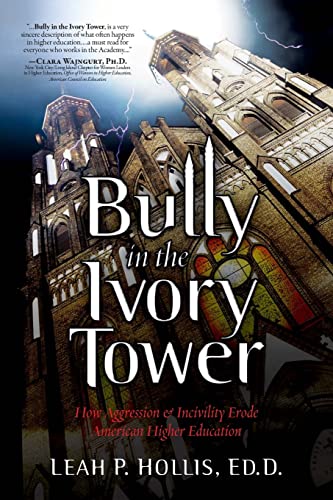Bully in the Ivory Tower
How Aggression and Incivility Erode American Higher Education
Leah P. Hollis
BOOK REVIEW

In Bully in the Ivory Tower, Leah P. Hollis strikes at the very heart of a crisis plaguing American higher education: aggressive behaviors and incivility that corrode the ideals of learning and respect. With incisive clarity, she reveals how bullying manifests in academia, illustrating a disturbing truth that many would rather ignore. This book is more than a collection of anecdotes-it's a call to action, a detailed roadmap to understanding and combating an insidious culture that has dominated campus life for far too long.
Hollis's expertise shines through, as she expertly navigates the labyrinth of higher education, showcasing how institutional structures often enable toxic behaviors. She draws on a wealth of real-life examples, painting vivid portraits of both victims and aggressors. Each narrative is a stark reminder that perhaps the most insidious form of bullying isn't as overt as physical intimidation; it creeps in silently, woven into the fabric of administrative decisions and departmental relationships.
Imagine walking the hallowed halls of a prestigious university, surrounded by knowledge, ambition, and potential. Yet, lurking just beneath the surface is a sinister reality-fellow academics engaging in relentless social warfare, undermining colleagues, and belittling students. Hollis doesn't sugarcoat the statistics; she confronts them head-on, capturing the reader's attention with heart-wrenching scenarios that leave a lasting impact. The stories resonate, not just because they are eye-opening, but because they are painfully relatable to anyone who has witnessed or experienced such behavior.
What sets this work apart is its blend of scholarly rigor and emotional weight. Hollis's background in education lends credence to her claims, allowing her to frame her analysis within broader societal issues. Here, the book becomes a mirror reflecting the challenges of modern leadership, communication, and community building in educational institutions. It forces the reader to ponder: What kind of environment do we want our institutions to embody? How do we ensure that the next generation of educators are not only knowledgeable but also compassionate and respectful? The answers are layered, complex, and perhaps even uncomfortable-much like the narrative Hollis weaves throughout the text.
Reader feedback surrounding Bully in the Ivory Tower has been passionately divided. Many praise Hollis for her unabashed exploration of a topic often brushed under the rug. They commend her for empowering victims through awareness, elucidating the hidden dynamics that perpetuate a cycle of aggression. On the other hand, some critics argue that her approach lacks actionable solutions, calling for a more prescriptive framework for change. They question whether simply exposing the problem is sufficient-demanding instead a heavier emphasis on strategies to foster a culture of respect.
Yet, perhaps this tension is precisely what makes Hollis's work so vital. It doesn't provide easy answers but rather provokes introspection and discourse. It compels institutions to confront the harsh realities of their environments and reassess their roles in perpetuating a culture of bullying. Isn't that a powerful impetus for change?
At its core, Bully in the Ivory Tower urges us not just to witness but to act. It's an emotional wake-up call, not merely against the backdrop of academia but within a broader societal context. As the book exudes its urgency, it invites readers-students, educators, administrators, and policymakers alike-to engage in a dialogue about civility and respect within our institutions. The absence of these virtues impacts not only individual lives but the integrity of the educational system as a whole.
In a time when the landscape of education is shifting dramatically, where more voices than ever are demanding inclusivity and respect, Hollis's work stands as a beacon of hope and a rally cry for change. The emotional rollercoaster you'll experience while reading will leave you questioning your own educational experiences and igniting a passion for advocating for improvement. 💥
Don't miss out on this compelling exploration; it might just transform the way you view education and the critical need for civility within it. Bully in the Ivory Tower is not just a book-it's an essential conversation starter, challenging you to take a stand against the aggression and incivility that threaten to undermine our collective educational pursuits. The future of higher education might just depend on it. 🌟
📖 Bully in the Ivory Tower: How Aggression and Incivility Erode American Higher Education
✍ by Leah P. Hollis
🧾 164 pages
2012
#bully #ivory #tower #aggression #incivility #erode #american #higher #education #leah #hollis #LeahPHollis